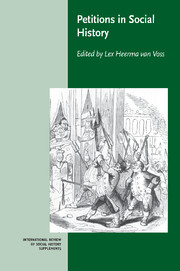Book contents
- Frontmatter
- Contents
- NOTES ON CONTRIBUTORS
- Introduction
- Voices from Among the “Silent Masses”: Humble Petitions and Social Conflicts in Early Modern Central Europe
- Supplications between Politics and Justice: The Northern and Central Italian States in the Early Modern Age
- The Power of Petitions: Women and the New Hampshire Provincial Government, 1695–1700
- Officially Solicited Petitions: The Cahiers de Doléances as a Historical Source
- Revolt, Testimony, Petition: Artisanal Protests in Colonial Andhra
- Deference and Defiance: The Changing Nature of Petitioning in British Naval Dockyards
- Petitions and the Social Context of Political Mobilization in the Revolution of 1848/49: A Microhistorical Actor-Centered Network Analysis
- The Image of Jews in Byelorussia: Petitions as a Source for Popular Consciousness in the Early Twentieth Century
- “Begging the Sages of the Party-State”: Citizenship and Government in Transition in Nationalist China, 1927–1937
- Private Matters: Family and Race and the Post-World-War-II Translation of “American”
Private Matters: Family and Race and the Post-World-War-II Translation of “American”
Published online by Cambridge University Press: 04 August 2010
- Frontmatter
- Contents
- NOTES ON CONTRIBUTORS
- Introduction
- Voices from Among the “Silent Masses”: Humble Petitions and Social Conflicts in Early Modern Central Europe
- Supplications between Politics and Justice: The Northern and Central Italian States in the Early Modern Age
- The Power of Petitions: Women and the New Hampshire Provincial Government, 1695–1700
- Officially Solicited Petitions: The Cahiers de Doléances as a Historical Source
- Revolt, Testimony, Petition: Artisanal Protests in Colonial Andhra
- Deference and Defiance: The Changing Nature of Petitioning in British Naval Dockyards
- Petitions and the Social Context of Political Mobilization in the Revolution of 1848/49: A Microhistorical Actor-Centered Network Analysis
- The Image of Jews in Byelorussia: Petitions as a Source for Popular Consciousness in the Early Twentieth Century
- “Begging the Sages of the Party-State”: Citizenship and Government in Transition in Nationalist China, 1927–1937
- Private Matters: Family and Race and the Post-World-War-II Translation of “American”
Summary
The US Constitution preserves the right of the people to petition the government for redress of grievances. This right allows individuals to request private legislation from Congress and, as such, private bill petitions involve individual claims or pleas for relief for a specified person, or persons. Private petitions to Congress fall into two principal categories: claims against the US government (e.g., claims stemming from automobile accidents with government vehicles) and relief from immigration and naturalization laws. Although private laws concerning immigration and naturalization have influenced later public legislation by highlighting areas in need of reform, the private laws have limited application. Other than serving as precedent for subsequent private legislation for similarly situated individuals making requests for enactment of private laws, the laws do not benefit anyone other than the named beneficiaries of the bills.
In the immigration and naturalization context, a private bill petition is the last resort to avoiding consequences required by the law, such as exclusion or deportation from the United States or denial of US citizenship. In order to receive consideration of her petition, the beneficiary of the bill must overcome at least the two threshold requirements of: (1) unusual hardship that would result from application of the existing law, and (2) lack of remedy under existing law. Assuming the petitioner can meet these requirements, she must then convince her Representative to introduce a bill that describes circumstances that persuade the House and Senate committees to report the bill favorably, and ultimately to convince Congress and the President that her particular situation merits circumventing the law.
- Type
- Chapter
- Information
- Petitions in Social History , pp. 209 - 234Publisher: Cambridge University PressPrint publication year: 2002
- 12
- Cited by



